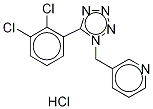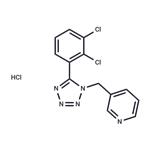Description
A-
438079 is a competitive antagonist of the nucleotide receptor P2X
7 (pIC
50 = 6.9). It inhibits both calcium flux and IL-
1β release mediated by P2X
7 while not affecting the activity of other P2X receptors. A-
438079 is effective in evaluating the role of P2X
7 in nociception, oxidative stress, and apoptosis in cells and animals.
Uses
3-[[5-(2,3-Dichlorophenyl)-1H-tetrazol-1-yl]methyl]pyridine is a 1-Benzyl-5-aryltetrazole derivative and potential antagonists for the P2X7 receptor.
in vitro
In 1321N1 cells stably expressing rat P2X 7 receptors, A 438079 blocks BzATP-(10 μM) evoked changes in intracellular calcium concentrations with an IC 50 of 321 nM. A 438079 is also selective for the P2X 7 receptor, at concentrations up to 100 μM.
in vivo
A 438079 (80 μmol/kg, i.v.) reduces noxious and innocuous evoked activity of different classes of spinal neurons in neuropathic rats. A 438079 (100 and 300 μmol/kg, i.p.) signi?cantly raises withdrawal thresh-olds in both the SNL and CCI models. Intraperitoneal injection of A 438079 (5 and 15 mg/kg) 60 min after triggering seizures reduces seizure severity and neuronal death within the hippocampus. A 438079 has superior neuroprotective effects compared with an equally dose of phenobarbital (25 mg/kg). A 438079 partially but signi?cantly prevents the 6-OHDA-induced depletion of striatal DA stores. Pretreatment with A 438079 reduces nociceptive behaviour scores in the HC model.
References
Nelson et al. (2006) Structure-activity relationship studies on a series of novel, substitutes 1-benzyl-5-phenyltetrazole P2X7 antagonists; J. Med. Chem. 49 3659
McGaraughty et al. (2007) P2X7-related modulation of pathological nociception in rats; Neuroscience 146 1817
Clark et al. (2010) P2X7-dependent release of interleukin-1beta and nociception in the spinal cord following lipopolysaccharide; J. Neurosci. 30 573
Kobayashi et al. (201) Induction of the P2X7 receptor in spinal microglia in a neuropathic pain model; Neurosci. Lett. 504 57
Chu et al. (2012) Inhibition of P2X7 receptor ameliorates transient global cerebral ischemia/reperfusion injury via modulating inflammatory responses in the rat hippocampus; J. Neuroinflammation 9 69



